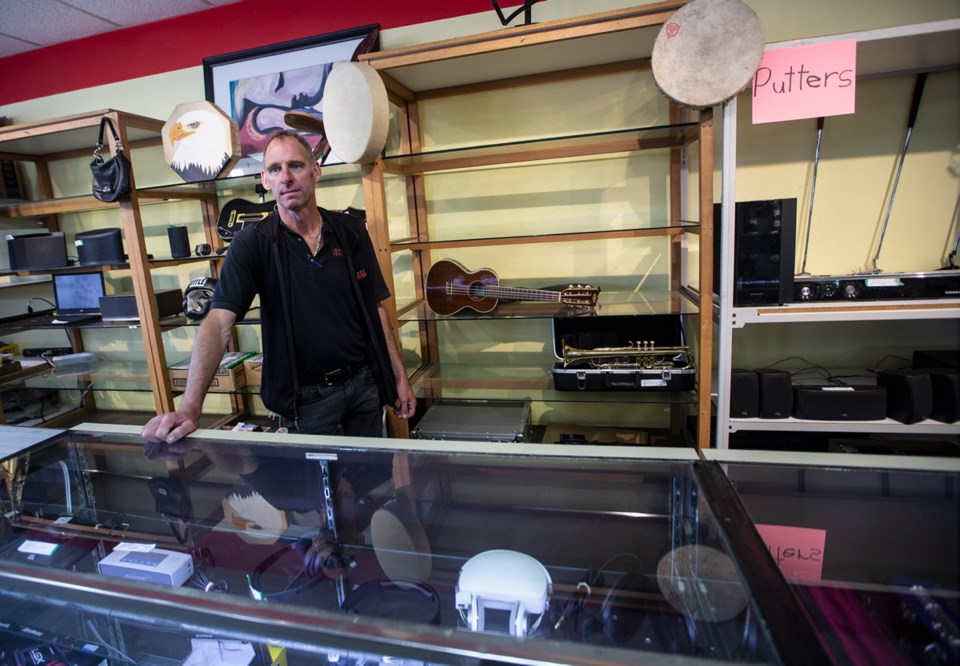Pawnshops and payday-loan lenders have long been harbingers of hard economic times.
But across the country, requests to pawn items are down and sales are up, which goes against conventional wisdom.
In Victoria, pawn shops have seen almost no customers coming in with items to pawn and a surge in buyers in the past few months.
“My sales are through the roof,” said Drew Layton, owner of Bay Street Broker. “But the shelves for pawns are down by about 75 per cent. I haven’t seen anything like this since 1998. It’s a little bit strange.”
In three to five months’ time, he said, his retail shelves could be empty of items of value that customers have not redeemed.
He attributes the downturn in pawns to the glut of Canada Emergency Response Benefit money to help those affected by COVID-19. The federal benefit provides people out of work due to the pandemic $500 a week for up to 16 weeks.
“People who don’t need money don’t have to pawn their stuff,” said Layton, who has been in operation for 25 years.
He said the payday-loan business has also been affected, although he is confident his business will “come back in spades” in the near future as people start to pawn some of the items they purchased with their CERB cheques.
Doug Scott, owner of Esquimalt Trading, reports a similar situation, with requests to pawn items down at least 30% and sales doubling in the past few months.
“While the sales end is good for the short term, pawns are our bread and butter and affects long-term profitability,” said Scott, the second-generation operator of the 44-year-old company. “Still, I am not begrudging what the government has done.”
He said that he is hurting for items for his shelves and anticipates it will be at least six months before the industry returns to normal.
In Calgary, John Sanford has been a pawnbroker for 20 years and said he has never seen anything like it.
“I rushed to the bank before this happened and I got all kinds of cash ready. I thought it was going to be a bonanza. But nope. Absolutely not,” said Sanford, co-owner of Rocky Mountain Pawn in Calgary.
“It was amazing how much stuff we got after 2015 when the oil went in the tank. We had lots of stuff. And now we have nothing.”
Pawnshops lend people money and typically give them 30 days to come back, repay the loan and retrieve their items. Sanford said about eight out of every 10 customers usually come back.
Sanford on average sees 15 to 30 pawns daily, but on a day last week, he’d only had one by mid-afternoon.
“From the people we’ve talked to and who have come in, the economy’s awash with free money. There’s some people bragging how much they’re getting on CERB,” he said.
On the bright side, Sanford said, items that have been sitting in storage for years have been sold. Gold rings, chains, Rolex watches, TVs, video-game consoles and stereos flew off the shelves early in the health crisis. Guitars have also been popular.
But with supplies disappearing and nobody pawning items, Sanford predicts a reckoning is coming soon.
“As far as pawns go, this is going to be the worst month since 1982 for lending out money. Thirty days from now, we won’t even make enough money to pay our rent.”
The co-owner of Halifax Buy and Sell said business has also been slow.
“It’s really strange,” said Robert Blotnicky.
“Literally everybody coming through the store is looking to spend money from their CERB cheques and trying to buy things to secure their needs.”
People also rushed in to pay to get their pawned items back.
“At this point, our pawn shelves are very bare.”
The payday-loan industry is also struggling, said Alan Evetts, a director of the Canadian Consumer Finance Association and an owner of MyCanadaPayday.com in Vancouver.
In the first six weeks of the pandemic, numbers across the industry were consistently down about 84 per cent from before the crisis, he said. “Things changed radically. The demand has been completely decimated by COVID.
“I think there are a few factors driving it. Spending is down to a huge degree while people are at home. And life is cheaper when you don’t leave your house.”
Evetts also blames high unemployment for the dropoff, since loans are dependent on customers having an upcoming payday to repay them.



